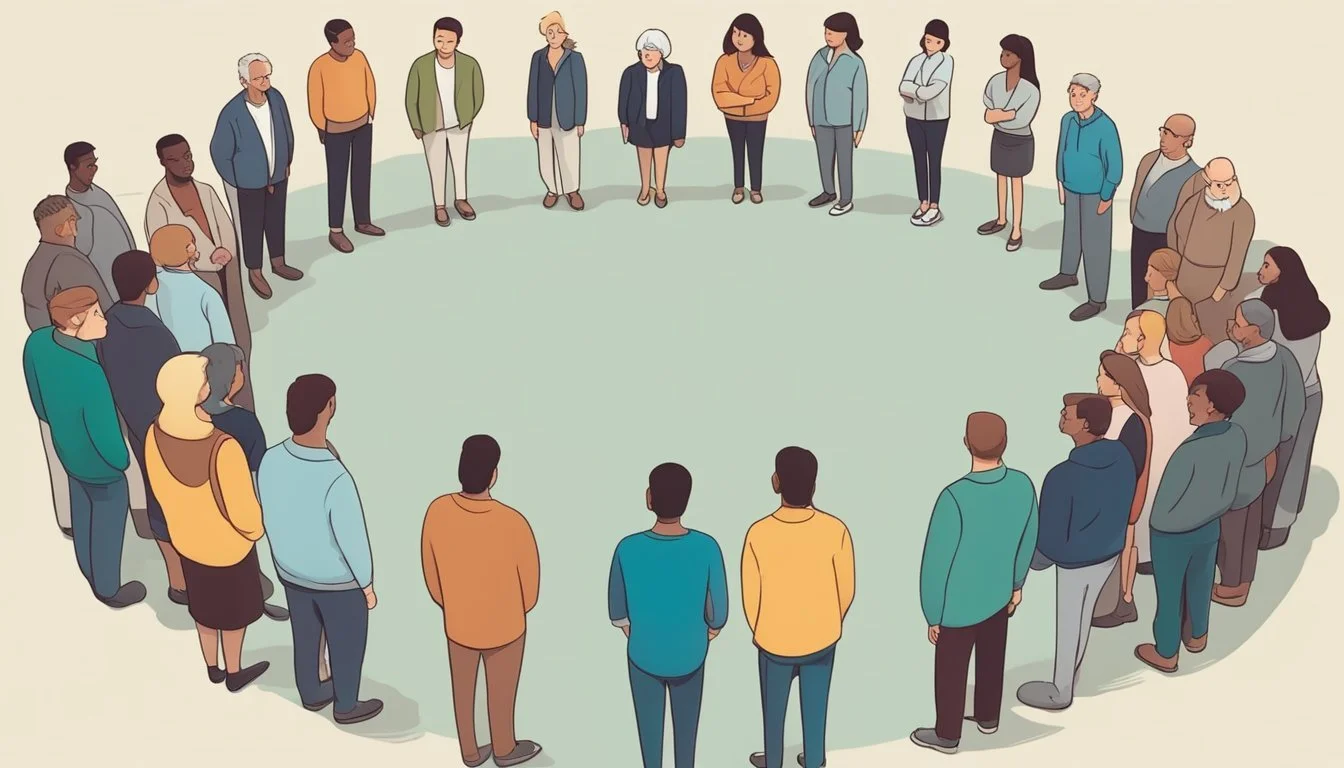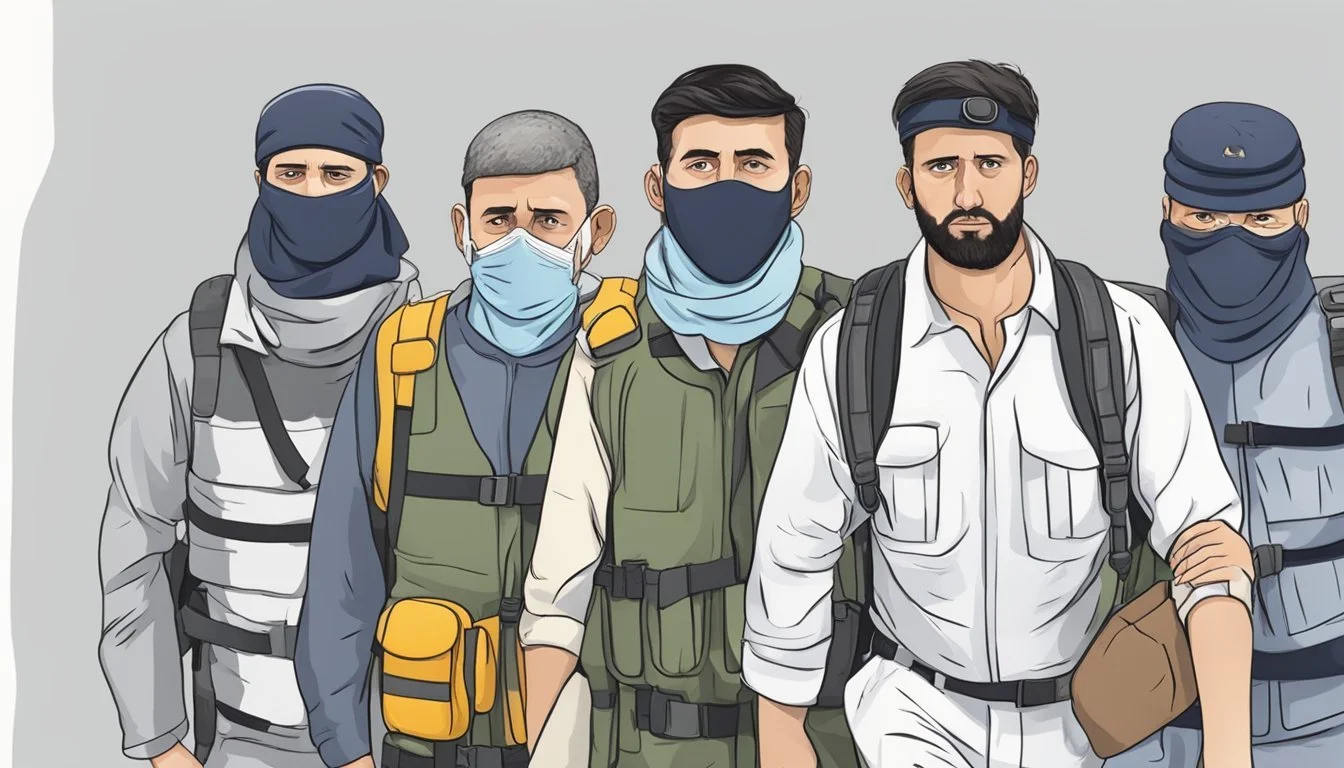9 Common Challenges Faced by Survivors of Terrorism
Key Issues and Coping Strategies
Surviving a terrorist attack imposes immense emotional and physical burdens on individuals, drastically altering their lives. These survivors often grapple with complex and multifaceted challenges that go beyond the immediate aftermath.
Understanding and addressing these challenges is crucial not only for the well-being of the survivors but also for the broader society that supports them. This article aims to shed light on some of the most common difficulties faced by survivors of terrorism, exploring the diverse ways these traumatic events affect their everyday lives.
1) Post-Traumatic Stress Disorder (PTSD)
Survivors of terrorism often face long-term mental health challenges, including Post-Traumatic Stress Disorder (PTSD). This disorder can manifest through flashbacks, nightmares, and severe anxiety. Daily functioning might be disrupted as individuals struggle with persistent, intrusive memories of the traumatic event.
Symptoms of PTSD can include avoiding places or situations that serve as reminders of the trauma. Survivors may also experience heightened arousal, such as being easily startled or feeling tense. These symptoms can interfere significantly with work, relationships, and daily activities.
The development of PTSD is influenced by various factors such as the intensity and duration of the traumatic exposure. Individuals lacking social support or those who believed their lives were in jeopardy are at greater risk of experiencing PTSD. The American Psychological Association notes that these factors significantly impact the survivor’s mental health.
Evidence shows that PTSD can persist for years if untreated. According to studies, many survivors still cope with PTSD decades after the event, similar to those who experienced the 9/11 attacks. Early intervention and access to mental health services are crucial in mitigating long-term effects.
2) Survivor's Guilt
Survivor's guilt is a frequent emotional response among those who have lived through terrorist attacks. This phenomenon occurs when individuals feel remorse for having survived while others did not. It's an emotional burden that can be particularly intense.
Those experiencing survivor's guilt may find it difficult to enjoy life. They might feel that they do not deserve happiness or success. This can lead to chronic feelings of sadness and self-blame.
This kind of guilt is a common experience after traumatic events and often requires psychological support. According to MD Anderson Cancer Center, many individuals who endure traumatic events struggle with similar emotions.
One cognitive approach to addressing survivor's guilt is to reframe these thoughts. This method focuses on recognizing that feeling guilty does not equate to actual responsibility for the event's outcome.
A person living with survivor's guilt might benefit from professional guidance. Licensed clinical psychologists, like Catherine Powers at MD Anderson, emphasize the importance of addressing these feelings through therapy.
Survivor's guilt is not officially classified as a clinical diagnosis but is widely acknowledged in the mental health community. Talkspace elaborates on its impact by highlighting the long-term effects it can have, such as in the case of Pasquale Buzzelli, a 9/11 survivor, who discussed his ongoing struggles.
Recognizing survivor's guilt as a genuine and treatable condition is essential. It validates the experiences of those who live with it and opens up pathways to healing. This can lead to better mental health outcomes for survivors.
3) Physical Injuries and Disabilities
Survivors of terrorism often face severe physical injuries. These can range from broken bones and soft tissue injuries to more severe conditions such as long-term chronic pain and sensory disturbances. For instance, many victims may deal with chronic pain resulting from their injuries, which can significantly impact their daily lives.
In some cases, survivors also experience disabilities that result from the immediate aftermath of an attack. These disabilities can include amputations, paralysis, or other forms of impaired mobility. Long-term medical care and rehabilitation are often necessary to manage these disabilities.
Additionally, physical injuries can bring about visceral symptoms. Survivors may deal with cardiovascular and respiratory difficulties, as well as gastrointestinal and urological problems. These complications can add another layer of challenges, requiring further medical attention and support.
The need for ongoing medical treatment is significant among survivors. Emergency care in the immediate aftermath is critical, as seen with rapid assessments of injuries among survivors. The long-term medical costs and the physical burden on patients highlight an important aspect of the recovery process after a terrorist attack.
4) Mental Health Stigma
Survivors of terrorism often grapple with mental health issues, such as depression, anxiety, and PTSD. Despite the evident need for psychological support, many individuals avoid seeking help due to the stigma associated with mental health.
This stigma can manifest in various ways. Survivors might fear being judged or misunderstood by their peers, family, or community. Concerns about being labeled as "weak" or "damaged" can deter them from accessing necessary services.
Cultural influences also play a significant role. In some cultures, mental health is a taboo subject, making it even more difficult for survivors to voice their struggles or seek professional assistance.
The reluctance to seek help can have severe consequences. Without proper support, the symptoms of mental health conditions can worsen, leading to a decline in overall well-being and daily functioning.
Educational initiatives aimed at reducing stigma and promoting mental health awareness are crucial. Increasing public understanding about the normalcy of seeking mental health care can encourage more survivors to pursue the help they need.
Prominent figures and community leaders speaking openly about mental health can also help normalize these conversations. By fostering an environment where mental health is prioritized, society can better support individuals in their recovery journey.
In the aftermath of terrorist attacks, a supportive and stigma-free environment is essential for effective healing and recovery.
5) Lack of Access to Support Services
Survivors of terrorism often encounter significant difficulties in accessing necessary support services. One primary challenge is the lack of proper identification or documentation, which can inhibit their ability to enroll in essential services and access resources.
Immediate needs such as medical care, food, and temporary shelter usually receive attention. However, there is often a lack of support for long-term necessities like mental health care and stable housing.
Many survivors perceive that they need to be in a state of crisis to qualify for services. This misconception can delay their access to long-term support, exacerbating their trauma.
Additionally, survivors often face barriers at the community level. Responders may be ill-equipped to offer the specific support required, leading to gaps in service delivery.
Fear of law enforcement or other legal authorities can also prevent survivors from seeking help. This fear is often leveraged by their perpetrators to maintain control and discourage escaping.
For more information on the hurdles faced by survivors of human trafficking, similar to those encountered by terrorism survivors, visit the New Tactics website.
Ethically designed technological solutions have the potential to mitigate these issues by increasing the efficiency and accessibility of support services. Organizations are beginning to explore these avenues to provide better assistance to survivors. More details can be found at the MIT Solve Challenge.
6) Financial Instability
Survivors of terrorism often face significant financial instability. Terrorist attacks can cause direct damage to property and infrastructure, leading to substantial economic losses.
In many cases, survivors may lose their primary source of income. The immediate aftermath of an attack often disrupts businesses and employment opportunities, posing a challenge for those directly affected to maintain financial stability.
The broader economy can also experience negative impacts. Increased volatility in financial markets and heightened risk perceptions can make it difficult for survivors to secure loans or investments.
For those in developing countries, these issues are often magnified. Economic activities come to a halt, and government resources are strained, making financial recovery more challenging. Vulnerable economies may struggle to provide adequate support for affected individuals.
Furthermore, healthcare costs add another layer of financial burden. Survivors may require long-term medical care and psychological support, which can be expensive and insufficiently covered by insurance, requiring out-of-pocket expenses.
Addressing these challenges requires comprehensive support systems. Governments and financial institutions must work together to provide immediate and long-term financial assistance. Efforts should also focus on ensuring resilience in economic systems to minimize the disruption caused by terrorist events.
Developing targeted financial aid programs and promoting financial inclusion can play a crucial role. Providing resources and support can help survivors rebuild their financial lives and mitigate the adverse effects of terrorism on their economic well-being.
7) Disrupted Family Dynamics
Survivors of terrorism often face significant disruptions in family dynamics. The immediate aftermath of an attack can lead to acute stress, overwhelming families. These events can strain relationships, causing tension and miscommunication among family members.
Children exposed to terrorism may develop anxiety and behavioral problems. This can cause parents to struggle with balancing their own trauma while supporting their children. Family bonds can become fragile, making daily interactions difficult.
In many cases, families might experience long-term disruptions. According to Springer, the effects of terrorism can linger for years, affecting the overall family structure. Constant fear and hyper-vigilance may become common, disrupting normal family functions.
Extended families are also impacted. Kinship ties may either strengthen in the face of shared trauma or weaken due to emotional exhaustion. Terrorists may exploit these familial bonds, further complicating the family dynamic (West Point).
The altering of family dynamics can also affect each member’s mental health. Torn between mutual support and personal recovery, family members might find it challenging to move forward collectively.
Effective family communication and professional support can help mitigate these challenges. By addressing these issues, families can work towards restoring their dynamics and building resilience.
8) Social Isolation
Social isolation can have profound effects on survivors of terrorism. After experiencing such traumatic events, individuals may withdraw from social interactions.
Feelings of detachment and loneliness are common. The fear and anxiety stemming from the attack lead many to avoid social settings, exacerbating the sense of isolation.
Research highlights that social isolation is a significant factor contributing to both psychological and physical distress among survivors. A study by Michaela Pfundmair suggests that social exclusion can increase vulnerability to radicalism and extremism, potentially impacting long-term mental health.
Social isolation is also linked to an increased risk of depression and anxiety. Lack of social support can hinder recovery, making it difficult for survivors to return to normalcy. Prolonged isolation can lead to severe psychological conditions, including Post-Traumatic Stress Disorder.
Efforts to mitigate this isolation are crucial. Community support and access to mental health services play vital roles in helping survivors reconnect with society. Activities that promote social engagement and provide consistent emotional support can significantly improve their overall well-being.
9) Triggers and Flashbacks
Survivors of terrorism often experience triggers and flashbacks. These can occur unexpectedly and are usually related to sensory experiences reminiscent of the traumatic event.
Triggers can include loud noises, certain smells, or locations similar to the site of the attack. When exposed to these, survivors might relive the trauma, leading to intense emotional and physical reactions.
Flashbacks are more intense and involve vividly re-experiencing the event. During a flashback, the survivor may feel as if they are back in the traumatic situation, complete with sights, sounds, and even physical sensations.
Understanding triggers is crucial in managing PTSD symptoms. Strategies like avoiding known triggers and using grounding techniques can help reduce the impact.
Support systems and therapy are essential for aiding survivors in managing these symptoms. It is important to recognize these experiences as common responses to trauma and seek appropriate interventions. You can learn more about managing triggers by treating the underlying causes at Khiron Clinics.
Coping with Psychological Trauma
Coping with psychological trauma following a terrorist attack involves understanding PTSD, engaging in therapeutic interventions, and building mental resilience. These strategies are crucial in addressing the emotional and psychological aftermath survivors often encounter.
Understanding PTSD
Post-Traumatic Stress Disorder (PTSD) is a common condition among terrorism survivors. Symptoms include flashbacks, nightmares, and severe anxiety. PTSD can significantly affect daily functioning and personal relationships.
Survivors often relive the trauma through intrusive memories. Emotional numbness and avoidance of places or people that trigger recollections are also typical. For accurate diagnosis, symptoms must persist for more than a month and cause substantial distress.
Recognizing these symptoms early is essential for effective treatment. Understanding PTSD helps demystify the disorder, encouraging survivors to seek help. Resources like the National Center for PTSD provide valuable information.
Therapeutic Interventions
Various therapeutic interventions effectively address psychological trauma. Cognitive Behavioral Therapy (CBT) helps modify unhelpful thinking patterns and behaviors associated with trauma. Exposure therapy, a component of CBT, gradually introduces survivors to trauma-related memories in a controlled environment.
Another effective approach is Eye Movement Desensitization and Reprocessing (EMDR). This technique reduces the distress associated with traumatic memories by using bilateral stimulation.
Critical Incident Stress Debriefing (CISD) was widely used post-9/11 to provide immediate support to survivors. Although initially popular, its effectiveness is now debated. Psychological first aid focuses on meeting survivors' practical needs, ensuring safety, and offering emotional support.
Accessing professional help early enhances recovery. Survivors should consider engaging in therapeutic sessions with licensed mental health professionals.
Building Mental Resilience
Building mental resilience is vital for long-term recovery. Resilience can be cultivated through various strategies, including maintaining social connections and practicing self-care.
Participating in community and support groups enables survivors to share experiences and gain mutual support. Group activities can help rebuild a sense of normalcy and belonging.
Physical activities like exercise improve mental health by reducing stress hormones and stimulating endorphins, which enhance mood. Mindfulness practices and meditation promote relaxation and emotional regulation.
Developing coping strategies, such as journaling and setting realistic goals, empowers individuals to manage stress more effectively. Enhancing mental resilience helps terrorism survivors navigate their recovery journey more confidently.
Navigating Social Challenges
Survivors of terrorism often face numerous social challenges that can impede their recovery. The two primary areas of concern are maintaining effective support systems and successfully integrating back into their communities.
Support Systems
Effective support systems are crucial for survivors. Friends, family, and professional counselors provide emotional and psychological assistance necessary for healing. Communities must be educated on the importance of offering consistent and empathetic support.
Counseling services tailored to the trauma experienced can empower survivors to express their feelings and fears openly. Support groups consisting of other survivors can also offer a space for shared experiences and mutual understanding, fostering a sense of belonging.
Community Integration
Community integration is vital for a survivor's sense of normalcy and stability, allowing them to rebuild their lives. Involvement in local activities, educational programs, and employment opportunities can help survivors feel connected and purposeful.
Communities should also work to reduce stigma associated with being a survivor of terrorism. Promoting awareness and sensitivity through education can create a more inclusive environment. Practical measures like accessible public services and community-based rehabilitation programs can further facilitate smooth reintegration.
Managing Physical Injuries
Effective management of physical injuries sustained during terrorist attacks requires a combination of targeted rehabilitation techniques and chronic pain management strategies.
Rehabilitation Techniques
Survivors often suffer from a range of injuries such as burns, fractures, and inhalation injuries. Techniques such as physical therapy, occupational therapy, and respiratory therapy are critical.
Physical therapy helps restore mobility through exercises that target muscle strength and flexibility. This can be essential for those with fractures or muscle damage. Occupational therapy focuses on helping individuals regain the ability to perform daily activities, offering support with any adaptations they may need.
Respiratory therapy is particularly important for survivors with inhalation injuries. Techniques here include breathing exercises and the use of devices to improve lung function. Incorporating multiple therapeutic approaches ensures a comprehensive recovery.
Chronic Pain Management
Chronic pain can significantly affect a survivor's quality of life. Managing this pain often requires a multi-faceted approach combining medications, physical exercises, and psychological support.
Medications can include both over-the-counter pain relievers like ibuprofen and prescription drugs such as opioids, which need careful monitoring to avoid dependency. Physical exercises aimed at reducing pain include stretching and low-impact activities like swimming.
Psychological support is another crucial element. Pain management programs often integrate cognitive-behavioral therapy (CBT) to help patients cope with pain mentally. This combination of medical and psychological treatments helps survivors maintain a more balanced life.









